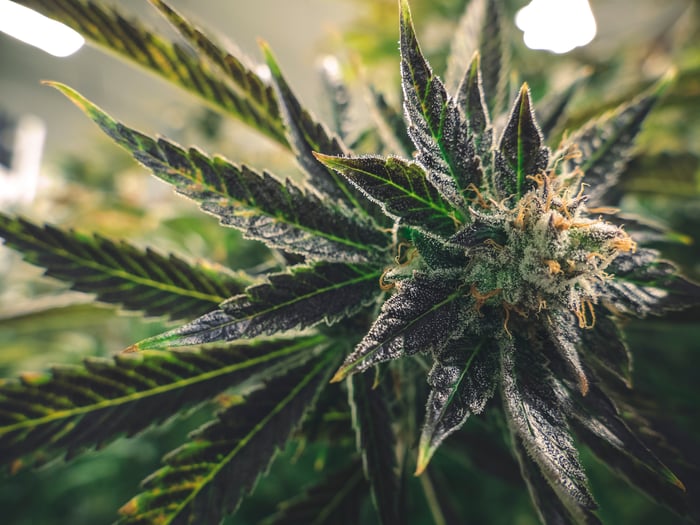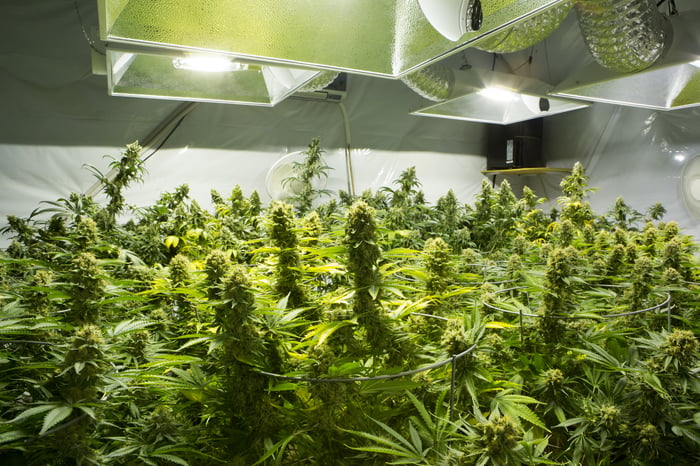The marijuana industry has come an incredibly long way in relatively short amount of time. What had been considered a taboo topic is no longer. Following the passage of the Cannabis Act in Canada last year, our neighbor to the north became the first industrialized country in the world to legalize recreational marijuana. We also witnessed the highest approval for legalizing cannabis in the U.S., according to Gallup, in its nearly 50 years of polling.
This transformation all translates into one thing: big money for opportunistic marijuana stocks.

Image source: Getty Images.
According to Wall Street investment firms, the cannabis industry looks to be on pace for $50 billion to $75 billion in annual global sales by the end of the next decade, up from "only" $12.2 billion globally in 2018. This money has to go somewhere, which is why investment dollars have been pouring into pot stocks.
But, as investors, we also know that no two stocks are ever created equally, and there's always room for improvement with every company -- even in the marijuana industry. One case in point is Cronos Group (CRON -2.79%), the third largest pot stock by market cap, and one of the year's top performers following the closing of Altria's $1.8 billion equity investment into the company.
Cronos Group should consider using its cash to acquire one of these three companies
On the surface, there's not much to complain about, with Cronos Group's share price up 64% since the year began. But dig deeper, and you'll find plenty of deficiencies. Perhaps none is more glaring than its subpar production, which likely comes in at 120,000 kilos at peak annual output for a company with a $5.7 billion market cap. Worse yet, most of this production won't be fully online until next year. If Cronos is to become a major player, it's going to need to beef up its production significantly, and doing so organically might take too long with so much market share up for grabs at the moment.
Rather, flush with $1.82 billion in cash on hand, Cronos Group might be best served if it goes shopping and buys additional capacity. Though yours truly hasn't been the biggest fan of the premiums paid for cannabis acquisitions to this point, buying capacity looks to be the best option for Cronos Group, with market share still up for grabs in Canada and in overseas markets.
The big question is, which pot stocks should Cronos consider buying? Let's take a look.

Image source: Getty Images.
CannTrust Holdings
If Cronos Group were all about aggregate production at the cheapest possible cost, it probably couldn't go wrong by making a bid for Ontario-based CannTrust Holdings (CNTTQ), which is currently valued at $759 million.
CannTrust recently lost about 30% of its value after reporting a wider-than-expected loss. However, the company also announced that it had signed a letter of intent to purchase 200 acres of outdoor growing space that would allow it to double or triple its peak production capacity.
Right now, CannTrust has 450,000 square feet of completed cultivation space at its flagship Niagara facility, and 60,000 square feet of grow space at its Vaughan facility. Both Niagara and Vaughan are hydroponic grow farms, which mean they grow cannabis plants in a nutrient-rich water solvent, as opposed to traditional soil. With access to cheap sources of water and electricity, Niagara and Vaughan offer low-cost, high-yield output potential.
With the mid-January announcement (following a six-month stalemate) that an additional 390,000-square-foot expansion was approved in the town of Pelham to the Niagara facility, CannTrust has a clear path to about 100,000 kilos of peak output. The addition of outdoor growing space means CannTrust should be able to produce 200,000 kilos to 300,000 kilos a year, beginning in 2021.
If Cronos were to make a play for CannTrust, a company that's located in its home province, it could boost its output to between 320,000 kilos and 420,000 kilos annually by 2021, easily pulling into the third spot on the producers list, which is where it belongs if it's going to sport a $5.7 billion market cap. Even with a substantial premium of say 50%, Cronos Group could acquire CannTrust in an all-cash deal, which would make it even likelier to be accepted by CannTrust's shareholders.
In my view, no deal offers better bang for the buck for Cronos Group.

Image source: Getty Images.
OrganiGram Holdings
While CannTrust might offer the best bang for the buck, OrganiGram Holdings (OGI -3.09%) would provide a slew of domestic competitive advantages that Cronos Group might struggle to pass up. Of course, it's going to cost Cronos a bit more to acquire OrganiGram, should it choose that route.
OrganiGram is based in New Brunswick and is Canada's only major Atlantic-based grower (i.e., north of 100,000 kilos a year, at peak capacity). With so few growing facilities set up in the Atlantic, OrganiGram has a geographic supply advantage in New Brunswick, Prince Edward Island, Nova Scotia, and Newfoundland and Labrador. Interestingly enough, the fourth-quarter National Cannabis Survey in Canada found that adults in these Atlantic regions more regularly used marijuana than in more populated provinces.
OrganiGram's only growing campus, Moncton, is also quite the marvel. Covering only 490,000 square feet, peak annual production is expected to hit 113,000 kilos, with grow room construction complete by October 2019. For you math-phobes, this works out to more than 230 grams per square foot, which is well over double the industry average yield per square foot. Such impressive yield is achieved by using three tiers of growing at its Moncton campus, thereby maximizing greenhouse space.
This is also one of only three pot stocks to have secured long-term cannabis supply deals with all of Canada provinces. On Feb. 26, OrganiGram signed a letter of intent to supply Quebec with marijuana, which was the lone province it didn't have a supply deal with before this announcement.
Put in another context, OrganiGram gives Cronos Group access to all of Canada's provinces while yielding more than double the industry average at its only campus. Acquiring OrganiGram would pretty much double Cronos Group's output to around 230,000 kilos, sliding it into a top-five position among growers.
How would such a deal get done? My suspicion is it would be a roughly 50-50 cash-and-stock deal, with OrganiGram shareholders likely wanting a premium of at least 25%, based on the $1.06 billion market cap this past weekend.

Image source: Getty Images.
Aphria
The third and final pot stock that Cronos Group should consider buying to boost its production capacity is Ontario-based Aphria (APHA). Once again, note that we're talking about a company located in the same province as Cronos Group.
Aphria is potentially slated to be the third-largest grower in Canada, with a company-forecast 255,000 kilos at its peak. Most of this production is expected to come from its four-phase, organic construction project known as Aphria One (110,000 kilos), and its partnership with Black Diamond Farms (known as Aphria Diamond) that saw greenhouses retrofitted for cannabis production (140,000 kilos). Sprinkle in its acquisition of Broken Coast Cannabis, which is capable of 5,000 kilos, and this works out to Aphria's 255,000 kilos of combined output. If Cronos Group were to acquire Aphria, it would be capable of around 375,000 kilos per year, at peak capacity.
On top of plenty of production, Aphria is also constructing an extraction center that'll be capable of producing up to 25,000 kilogram-equivalents per year when complete and fully operational. Cronos Group has done a good job of differentiating its production away from dried cannabis, and this extraction center would add yet another high-margin sales channel.
Furthermore, Aphria has a presence in about a dozen countries worldwide, mostly thanks to its acquisition of Nuuvera in March 2018. Buying Aphria would dramatically improve Cronos Group's international presence, which can be described as disappointing, at best.
The biggest hurdle with making a run at Aphria would be financing the deal. The largest marijuana acquisition in history goes to Aurora Cannabis, which bought MedReleaf for about $2 billion. Aphria already has a market cap of $2.53 billion, and it'd likely require a pretty significant premium (maybe 30% to 40%) to consider being acquired by Cronos. Further, I'd personally guess that at least 20% of the purchase price would need to be in cash, with the rest being financed using Cronos Group's common stock.
In short, it'd be a very dilutive deal to existing Cronos shareholders, but it might pay long-term dividends.





